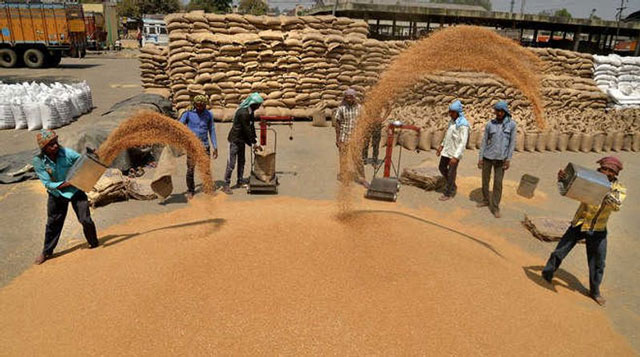Daijiworld Media Network – New Delhi
New Delhi, Oct 2: The Union Cabinet on Wednesday approved a hike of Rs 160 in the Minimum Support Price (MSP) of wheat, raising it to Rs 2,585 per quintal for the 2026-27 marketing season, up from Rs 2,425 per quintal last year.
Among other Rabi crops, safflower received the highest absolute increase of Rs 600 per quintal, followed by lentil (masur) with Rs 300, rapeseed and mustard with Rs 250, gram with Rs 225, and barley with Rs 170 per quintal.

Announcing the decision after the Cabinet meeting, Union Minister for Information and Broadcasting Ashwini Vaishnaw said, “The MSP hike will channel a total of Rs 84,263 crore directly to farmers. The procurement target for the 2026-27 Rabi season has been set at 297 lakh metric tonnes.”
Officials stated that the hike aligns with the Union Budget 2018-19 mandate to fix MSP at least 1.5 times the all-India weighted average cost of production. The projected margin over production cost stands at 109% for wheat, 93% for rapeseed and mustard, 89% for lentil, 59% for gram, 58% for barley, and 50% for safflower. The move is expected to ensure remunerative prices for farmers while encouraging crop diversification.
In another significant step, the Cabinet cleared a mission to achieve self-reliance in pulses production to reduce the country’s import dependency. The mission, with a financial outlay of Rs 11,440 crore, will be rolled out over six years from 2025-26 to 2030-31.
Vaishnaw said that although India is the world’s largest producer and consumer of pulses, rising incomes have pushed up consumption while domestic production has not kept pace, leading to a 15–20% increase in imports. The mission, announced in the Union Budget 2025-26, aims to meet growing demand, boost local production, and enhance farmers’ incomes.
The initiative will focus on research, quality seed systems, area expansion, procurement and price stability. Special emphasis will be given to developing high-yielding, pest-resistant and climate-resilient pulse varieties, with multi-location trials in major pulse-growing states to ensure regional adaptability.
To ensure timely seed availability, states will prepare five-year rolling seed production plans. The Indian Council of Agricultural Research (ICAR) will oversee breeder seed production, while state and Central agencies will handle foundation and certified seeds, monitored through the Seed Authentication, Traceability & Holistic Inventory (SATHI) portal.
By 2030-31, 126 lakh quintals of certified seeds are expected to be distributed to farmers, covering 370 lakh hectares of pulse cultivation, thereby strengthening India’s push towards aatmanirbharta (self-reliance) in pulses.